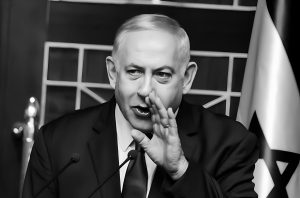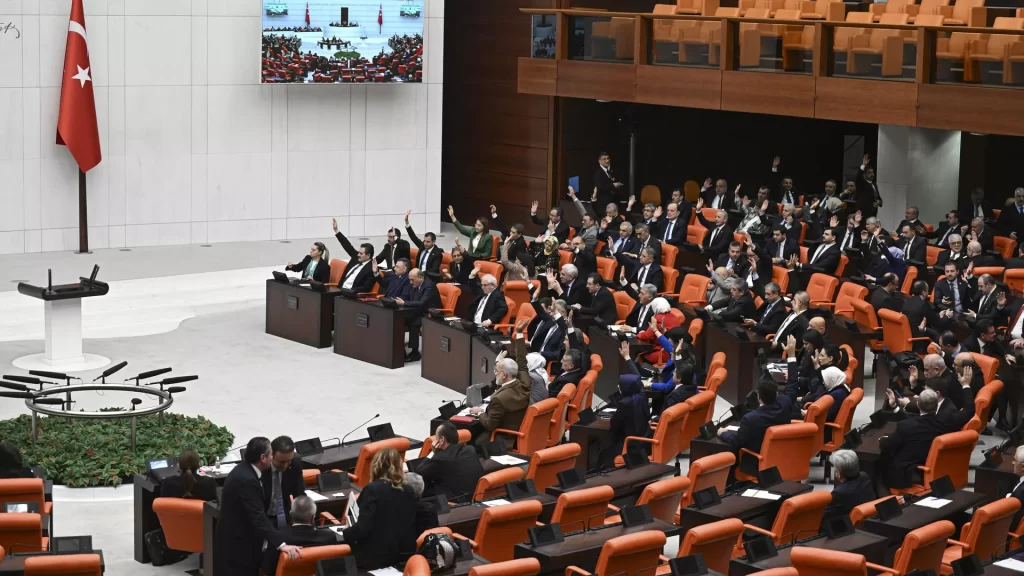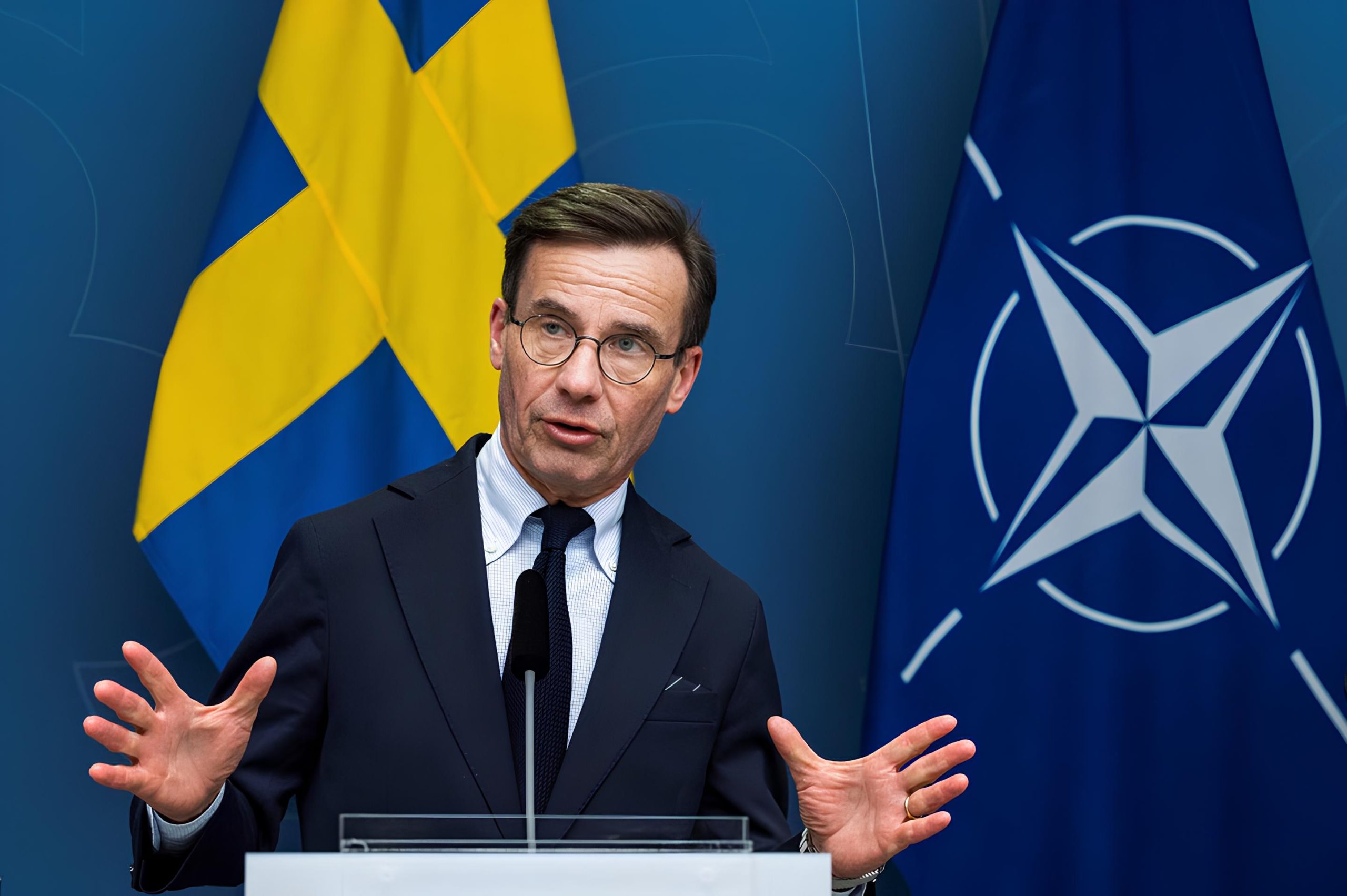
Türkiye’s objection to Sweden’s NATO membership revolves around Sweden’s reluctance to designate organizations like the PKK and YPG as terrorist groups and its handling of relations with these entities. Türkiye is concerned that this stance could weaken NATO’s unity in combating terrorism.
FEBRUARY 07, 2024

Russia’s annexation of Crimea in 2014 and a full-scale invasion of Ukraine, followed by military activity near the border of Finland and Sweden, has had an impact throughout the region. These changes have profoundly damaged Europe’s security scheme, with significant implications for the Baltic region. Sweden, like Finland and its Baltic neighbors, sees these developments as a direct threat to its security and the stability of the region.
Sweden, traditionally adhering to military non-alignment, is now exploring membership in NATO in response to shifting global security dynamics and Russia’s reemergence as a geopolitical actor in the Baltic Sea region. This strategic pivot has garnered significant regional support, strengthening collective security cooperation among neighboring nations facing similar challenges. However, Sweden’s path to NATO faced a substantial roadblock: Türkiye’s resistance, rooted in historical, geopolitical, and security concerns.
Sweden, for a long time recognized for its military non-alignment stance, has expressed an interest in joining the NATO. This potential shift in Sweden’s foreign policy has ignited intense debate and raised questions about its implications for regional stability and the interests of the different parties involved. Sweden’s participation in NATO is centered on the changing global security dynamics and the evolving complexion of regional instability. By aligning itself with the world’s most powerful military alliance, Sweden seeks to bolster its deterrence capabilities and enhance its collective security efforts.
Moreover, Sweden’s move towards NATO membership has garnered substantial support from its Baltic neighbors, many of whom are already part of the alliance. This collaborative approach enhances regional security, fostering a sense of collective security among neighboring nations confronted with similar challenges. The synergy created by the Baltic states’ membership in NATO emphasizes their shared commitment to regional stability and collective defense.
Sweden’s growing interest in joining the NATO has aroused global interest, but one important obstacle remained in the way: Türkiye’s resistance. As a long-standing NATO member, Türkiye has expressed concerns and objections to Sweden’s intentions to join the alliance. Understanding Türkiye’s point of view is critical to understanding the complex issues surrounding Sweden’s NATO plans.
Türkiye’s opposition to Sweden’s NATO aspirations is based on a complicated tangle of historical, geopolitical, and security considerations. PKK, which Türkiye, the United States, and the European Union have recognized as a terrorist group, is fundamental to Türkiye’s concerns. The PKK, founded in 1978, is a Kurdish militant group predominantly active in Türkiye.
On the other hand, YPG, which Türkiye recognizes and calls the PKK’s Syrian offshoot, and its actions in northern Syria have alarmed Türkiye. While the YPG has helped combat ISIS in Syria, Türkiye sees it as an extension of the PKK and a threat to its national security. The designation of the YPG as a partner in the war against ISIS by the US and the EU has been a source of dispute between Türkiye and its Western partners. Türkiye’s opposition to Sweden’s NATO plans is directly related to its opinion of Sweden’s attitude toward the PKK and YPG. Ankara has criticized Sweden’s perceived tolerance toward these groups, as well as its refusal to identify them as terrorist organizations. Türkiye claims that any country seeking to join NATO must share the alliance’s commitment to combating terrorism.
Türkiye’s concerns about Sweden’s NATO ambitions go beyond those terrorist organizations. Geopolitical tensions are also crucial. Türkiye has undeniable influence in the Black Sea due to its control of the straits. As a consequence of its dominance over the Bosphorus, it has the capacity to close the Black Sea if there is any kind of war. This is an unquestionable advantage for NATO. Furthermore, Türkiye is at a critical crossroads between Europe and Asia, with a long and varied history of contacts with adjacent areas, Türkiye is a major actor in regional security due to its unique geographical location, and it has been an active partner in NATO’s operations in the Eastern Mediterranean and the wider Middle East.
In addition to the terrorism claims, Quran-burning protests in Sweden and Denmark angered Muslim-dominated countries such as Türkiye. Türkiye condemned those protests and expressed that “permitting this anti-Islam act, which targets Muslims and insults our sacred values, under the guise of ‘freedom of expression’ is completely unacceptable.” As a response to those condemnations, the Swedish foreign ministry stated that “The burning of the Quran, or any other holy text, is an offensive and disrespectful act and a clear provocation. Expressions of racism, xenophobia, and related intolerance have no place in Sweden or Europe”.
Meanwhile, the tensions between Sweden and Muslim-majority nations grew, Swedish ministers and political scientists began to investigate the issues as part of Russia’s campaign to prevent Sweden from joining NATO. Not long after, Putin began visiting Muslim communities, including mosques, to show off and express his opinions about Quran-burning protests and seek the support and sympathy of the Muslim world against Sweden and NATO as well. Likewise, while these tensions remain critical concerns regarding Turkish-Swedish stress, Finland’s membership in NATO was a vital success, providing major safety in the region for Western European nations.
As the most populous and influential country in Scandinavia, Sweden’s membership in NATO is vital for the region’s security against potential Russian threats. With the region’s longest border with Russia, Finland’s full membership of NATO enhanced regional security. For the majority of NATO members, Sweden’s entrance to NATO is essential. NATO Secretary General Jens Stoltenberg stated at the 2023 Vilnius NATO Summit that “President Erdogan has agreed to forward Sweden’s accession protocol to the Grand National Assembly ASAP & ensure ratification”.
Especially after the full membership of Finland to NATO, the expectation regarding the full membership of Sweden is hampered. In October 2023, President Erdogan signed Sweden’s accession protocol and submitted it to the Turkish parliament. Not a long time after, just before the new year, the Turkish parliament’s Foreign Affairs Committee approved the membership of Sweden, which is considered a huge step.
Thus, Türkiye’s objections to Sweden’s NATO ambitions arise from fears that Sweden’s clear tolerance of these groups, as well as its unwillingness to label them as terrorist organizations, might weaken NATO’s commitment to combatting terrorism. To successfully handle and minimize risks, a NATO member must have a unified approach to security concerns, including terrorism. Türkiye is concerned that Sweden’s NATO membership may impede efforts to combat and dismantle these designated terrorist groups.
At the end of the day, the Turkish Parliament has voted overwhelmingly in favor of Stockholm’s NATO accession. Interconnected geopolitical dimensions, stressed by the US-linked F-16 fighter jet sales scenarios and the possibility of a second S-400 situation, highlight the complexities of international relations. Despite all of the ups and downs, crises, and arguments, the dispute is nearing its conclusion, with the full ratification of Ankara’s vote on January 24th, 2024, except for the final obstacle: Hungary.

Sweden is geographically located in the Baltic Sea region, and its exclusion from NATO may have an enormous impact on regional security. The Baltic Sea is a critical region, surrounded by numerous NATO member states. Sweden’s lack of NATO membership may limit its direct participation in regional security efforts, collective defense strategies, and the broader security environment in the Baltic Sea. On a global scale, this scenario may influence perceptions of Nordic-Baltic security cooperation and unity. Sweden, a prominent regional player, may find it difficult to fully integrate with NATO-led security initiatives in the Baltics. This could have an impact on the stability and security architecture of the Northern Europe and Baltic regions.
Furthermore, in terms of international security, Sweden’s non-membership could hamper NATO’s ability to effectively confront security challenges in the Baltic Sea region. Sweden’s active participation and commitment to the alliance will strengthen NATO’s collective defense capabilities and cohesion in the face of shifting threats, including possible forceful moves by external players. Sweden’s elimination from NATO could have an impact on regional dynamics in the Baltic Sea, affecting direct participation in security initiatives and changing perceptions of Nordic-Baltic security cooperation.
Furthermore, it may have an impact on NATO’s collective security operations, underlining the interconnection of regional and international security in an increasingly complex geopolitical scene. NATO as an international military alliance, often struggles on the issues of widening and decision-making processes. The main problems of them are the structure and decision-making mechanisms inherent to NATO. Traditionally, NATO has an intergovernmental structure that allows each member state to act as a vital part of the alliance, even though some members are more crucial – militarily – than others, all members have equal rights to block certain processes which creates complex and intergovernmental dilemmas.
The discord between Türkiye and Sweden, grounded in domestic political considerations, presented formidable obstacles to achieving consensus. Nevertheless, both parties played their roles and responsibilities by changing their political stances. Different levels of sensitivity on various issues continue to heighten tensions between Türkiye and Sweden. Historically conceived as an alliance opposing the USSR/Russia, NATO has been consolidating its presence, particularly in the territories of Eastern European members.
Türkiye, with the rights on Bosphorus, safeguards the Black Sea against potential threats from Russia, while the security of the Baltic Sea remains uncertain and incomplete in the absence of Sweden’s full membership. Even though the lack of security has been eradicated with the membership of Finland, Sweden’s membership would anchor the total security of the region.
From a broader perspective, a wealthy member in NATO such as Sweden would enrich NATO’s budget on military while consolidating Western economies on the same page. Sweden, possessing a significant military-industrial complex, could synergize its efforts with Western nations, not only in military capacities but also in intelligence. Sweden has the most influential intelligence agency in the region experienced in both world wars and Cold War. Military Intelligence and Security Service (MUST) and Swedish Security Police (SAPO) could cooperate parallel with NATO and serve more efficiently by protecting member’s interests in the region and related within.
As a multi-layered organization, the European Union does not have any serious military compound which creates an immense importance for NATO. For that reason, NATO is not only a defense alliance but also can be seen as a security project for Europe. Eastern European and Baltic states, which suffered under the USSR occupation, have the sensitivity regarding having complete protection under NATO. Baltic states are connected with the rest of Europe only with the thin connection called the Suwalki corridor, which is located between Kaliningrad (Russia) and Belarus.
In the case of any war between Russia and NATO, that corridor’s safety plays an important role for both sides. Russia might use that corridor to cut off the connection between the Baltics and other NATO members. Nevertheless, complete NATO superiority in the Baltic Sea would easily eliminate Russian connection with the Central and rest of Europe. From that strategic perspective, absolute NATO membership in the Baltic Sea plays a key role for NATO. Furthermore, in one of the last meetings, Swedish Prime Minister Kristersson presented Erdoğan an alliance agreement between Sweden and the Ottoman Empire. The agreement demonstrates mutual trust and the spirit of collaboration in both the Nordic and Turkish regions.
Turkish diplomats and policymakers know the reality in the region very well and interpret this issue as an opportunity to lift F-16s, F-35s, and various embargoes that have been going on for years. As Hungary gained back the EU’s funds after some political dilemmas, Türkiye also expected to gain political benefits focusing on its years-long waited disputes such as F-16s and F-35s. Despite Erdoğan and the Turkish parliament’s full ratification of Sweden’s NATO membership, Turkish nationalists continue to criticize the decision expressing terrorism concerns.
The answer will be clearer in the future but until now: Sweden has introduced an anti-terrorism bill that makes being a member of a terrorist organization illegal. Moreover, Sweden, Finland, Canada, and the Netherlands have lifted the restrictions regarding arms sales to Türkiye. Last, but most importantly, the US government has approved the sale of F-16 jet fighters for the worth of $23bn, as well as additional modernization kits for existing Turkish F-16s. From now on Sweden’s NATO future is in Hungary’s hands. On the other hand, Hungary has faced heavy criticism, which creates immense burden, from both the EU and other Western nations for its position on the Russia-Ukraine conflict.
A curated seletion of FA’s must-read stories.
Written By: SHAGNIK BARMAN
Written By: BERK TUTTUP
Written By: ABBY L’BERT
Written By: BILLY AGWANDA
Written By: HIRA SARWAR
Written By: BATUHAN GUNES
Written By: LEON REED
Written By: DARSHAN GAJJAR

Mucahit Sahin, who has honed his expertise in European Studies and European Central Bank Monetary Policies for four years, is currently studying Diplomacy and International Relations by means of research at several European universities. He lately does research on populism in Europe, human rights, and migration at Università degli Studi di Palermo in Sicily, Italy. In addition to his academic interests, he regularly attends to the events organized by international organizations in Europe.
Written By: GABRIEL RAMIREZ
Written By: DILARA SAHIN
Written By: DILRUBA YILMAZ
Written By: NILAY CELIK
Written By: ELDANIZ GUSSEINOV
Written By: JOSEF SCHOEFL
Written By: SELCAN BEDIRHANOGLU
Written By: FATIH CEYLAN
FA’s flagship evening newsletter guilding you through the most important world streis ofthe day. Delivered weekdays.
